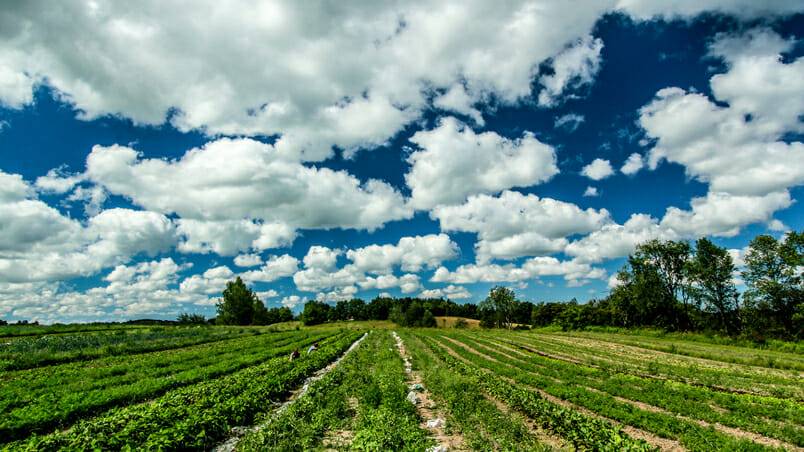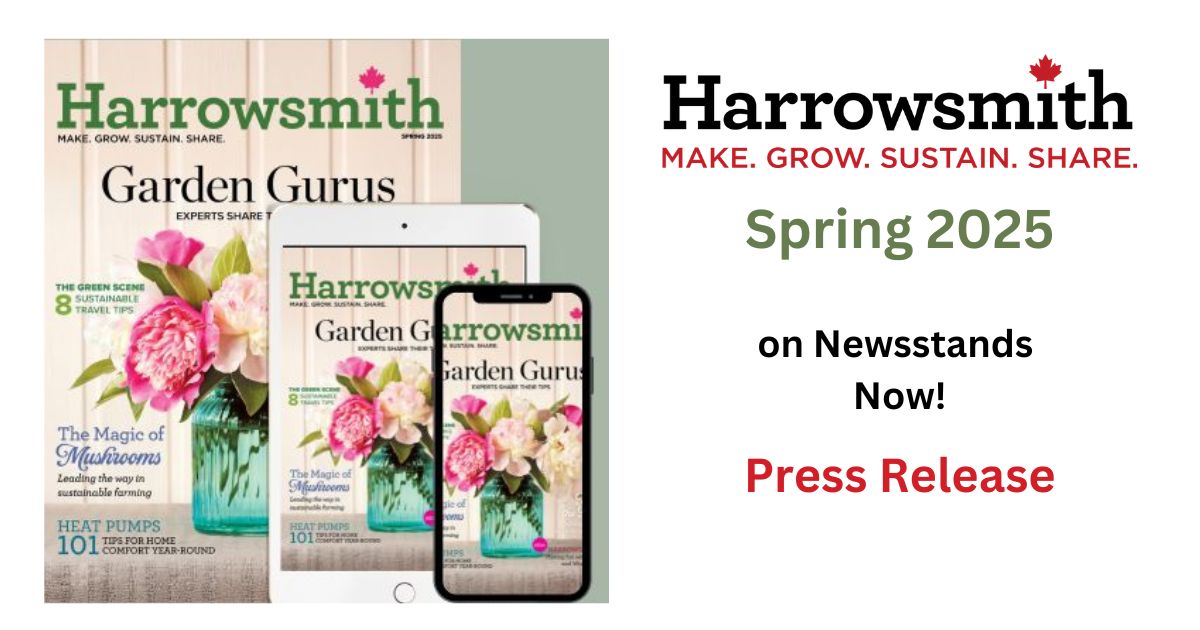Fifty-five bunches of chard, 75 heads of lettuce, 110 bunches of kale, 18 kg (40 pounds) of salad mix, 13.6 kg (30 pounds) of spinach, and many more items are assigned, and we set off to harvest. I finish harvesting my last bunch of kale and starting walk back to the truck. I pause to look up. The sun is starting to peek through the treeline, casting a romantic blush over the morning. The farm crew is scattered across the production fields, all off completing their own harvest numbers, thinking of the Harvest Share members and customers at farmers’ markets who will be taking this morning’s harvest home.

In its current form, Everdale, a farm in Hillsburgh, Ontario, has been home to mornings like this for almost 20 years. But with the farm’s roots going back to the mid-1960s, it’s hard to say just how many people have had a hand in growing the organization into what it is today. Everdale is a lot of different things, and the definition of what it is will change depending on whom you ask, but first and foremost, it is an educational space.
Beyond that, it’s a farm-based organization that provides solution-based food and farming education to build and engage healthy local communities. To accomplish this, Everdale delivers a wide range of programs to people of all ages. The three main pillars of Everdale’s work are farmer training, education programs and a certified organic production farm. The farm is the platform for the education programs that connect members of communities to their food and the farmers who grow that food.
Tens of thousands of people have come through Everdale’s gates since the 1960s, when the site opened as Canada’s first free school. After the school closed in 1974, the site remained neglected until 1997, when the soil was tilled once again and the property was established as an organic production farm.

The following year saw the first growing season and the development of one of Ontario’s first community-shared agriculture (CSA) programs. Harvest Share, as Everdale’s CSA is affectionately known, was and still is a tad different from other farms’ CSAs. Everdale’s Harvest Share is a self-selected model, with produce and value-added products being brought in from other farms and producers. And that is how the farm’s story—a little bit different than everyone else’s, but perfect just the same—has been written since those early days.
The organization was built on the dream that practical learning and hands-on experience would be the keys to forging a future where agriculture works hand in hand with the local environment. Everdale’s facilities and programs are designed to educate people about farm and food issues while fostering a connection between farmers, consumers and the environment.
It is in these connections, and the stories that come from them, that the magic of Everdale grows. When asked what I do or where I work, I often find myself stopping mid-sentence and saying with a smile, “You just need to come and visit. Once you’ve been there, you’ll understand.”
Over the years, I have learned that that is true for most people. The idea of knowing who grows your food is as foreign as the food that most people eat. What’s more, the idea of actually going to where your food is grown is unfathomable for some. I can attest to that: My first time going to a working farm was for my job interview. I had no idea what a harvest share was, farm camp was only a good idea to me then, and I had no clue how much the place on the left at the top of the hill on Sixth Line was going to shape my life.

During the past five years, the chapters in Everdale’s story have included being a part of the farm camp, school programs, farmers’ markets, Harvest Share pickups, the farm crew and so much more. Every day is different, every day is exciting, and I can genuinely say that I learn something new each day. The thousands of people who I have interacted with add so much colour to my growing book, and I am proud to share a page of Everdale’s story with them.
People come to Everdale for various reasons—to add a new perspective to an existing education, to look for answers about or a new perspective on the food system, or to move their life in a totally different direction. Everdale’s sustainable farming certificate (SFC) program, one of Ontario’s first farmer training programs, provides participants with the opportunity to learn about food and farming through a marriage of a comprehensive curriculum and hands-on application. Regardless of what brings them to Everdale, SFC students leave with a new appreciation of food and farming, lots of stories, and dirt under their fingernails. This branch of Everdale’s education programs is what sets the organization apart: the students get to learn the “why” in their classroom sessions while also spending a full season of farming putting those lessons and theories into practice—through their group garden project as well as by working with the farm team on a larger scale in the production fields.
Now in its 17th season, the success of the program can be measured in many ways, from the number of graduates to the tonnes of food that SFC students have planted, grown and harvested over the years. Perhaps the most meaningful testament is the changing outlook for both farmers and consumers. The SFC program has “grown” over 150 farmers who are now farming or have started their own farm businesses. These farms and farmers are the people who are spinning the plate and serving a new perspective on agriculture to you and your neighbours.
Partnered with the SFC program are school programs and the farm camp. One of the most interesting and important aspects of Everdale’s approach to agriculture education is the breadth of the programs that are offered. I have spent almost five years working with thousands of students and campers, guiding them through experiences with food and farming that they may not have otherwise had.

Five seasons of working with the farm camp has been an incredible way for me to help the youngest farmers start their journey to learn about healthy local food communities and where their food comes from. Rooted in our five focus areas—planting, harvesting, cooking, creative art and animal care—the camp enables campers to be immersed in the magic of Everdale. Seeing campers develop their understanding of food and farming and watching their eyes widen when they see a golden beet or a purple cherry tomato for the first time makes the days so meaningful for them and for me.
The organization has changed so much since it set down new roots in 1997, and I know it will continue to change as different students spend a season or more here on the farm and as more teachers and students come to learn about food and farming. Everdale is a special place for countless reasons. People have different memories about their season on the farm while completing their SFC, or the first time they tried our famous carrots or experienced the beautiful sunrises and sunsets in Hillsburgh. But sharing these experiences is the most rewarding part for me in helping write Everdale’s history as it unfolds.
Adrienne is the farm camp and farm school coordinator at Everdale, a farm-based organization in Hillsburgh, Ontario. She has worked with thousands of students and youth from across southern Ontario and is often called upon to speak at conferences and events on the importance of curriculum linked to on-farm programming and how to integrate agriculture-based education into a traditional classroom setting.












